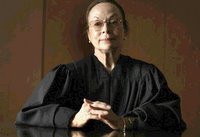
This from James Taranto of the Wall Street Journal:
"The federal judge who ruled last week that President Bush's eavesdropping program was unconstitutional is a trustee and an officer of a group that has given at least $125,000 to the American Civil Liberties Union in Michigan, a watchdog group said Tuesday," reports the New York Times:
The group, Judicial Watch, a conservative organization here that found the connection, said the link posed a possible conflict for the judge, Anna Taylor Diggs, and called for further investigation. . . .
The Web site for the group that supported the A.C.L.U., the Community Foundation for Southeastern Michigan in Detroit, lists Judge Taylor as its secretary and a trustee. It indicates that trustees make all financing decisions for the organization, whose assets exceed $350 million and which gives grants for a variety of community projects. . . .
The executive director of the Michigan A.C.L.U., Kary Moss, said her group had received four grants totaling $125,000 from the foundation since 1999. They were a $20,000 grant in 1999 for an educational program on the Bill of Rights, $60,000 in 2000, along with the N.A.A.C.P. and other groups for education on racial profiling, $20,000 in 2002 for work on racial profiling and $25,000 in 2002 for a lawyer to work on gay rights.
The ACLU is the lead plaintiff in the case and provided legal counsel to the other plaintiffs. Yet the legal ethicists the Times interviews don't seem overly concerned. One of them, Stephen Gillers of New York University, "said he did not think there were grounds for Judge Taylor to remove herself from the case":
"The question is whether her impartiality might reasonably be questioned," Professor Gillers said, "and the fact that she sits on the board of a group that gives money to the plaintiff for an otherwise unrelated endeavor would not in my mind raise reasonable questions about her partiality on the issue of warrantless wiretapping."
It seems to us that Gillers's impartiality might reasonably be questioned. In 2004 he wrote an article for The Nation, a left-wing magazine, in which he denounced Justice Antonin Scalia for going on a hunting trip with Vice President Cheney while Cheney v. U.S. District Court, a case involving the Office of the Vice President, was before the Supreme Court:
Scalia's opinion also claims that the appeal is not really about Cheney, who is sued only in his "official capacity," but about the power of the Vice President and the meaning of complex statutes. Ignored is the fact that rejection of the appeal can hurt Cheney politically in an election year if the secret records reveal a pro-industry bias in Cheney's leadership of the study group. That may also explain why Cheney stonewalled the nonpartisan General Accounting Office when it asked him for the same information.
An opposing argument could reveal these and other flaws in Scalia's logic and might well persuade a disinterested judge to reach a contrary conclusion. Judges have been disqualified for much less.
In the event, the court ruled in the vice president's favor, 7-2.
In a way Gillers is right to downplay the importance of the revelation about Taylor. Conflict-of-interest rules deal with appearances, and appearances are subjective, colored by the observer's political biases--which is why Gillers can be aghast at Scalia's friendship with Cheney but unbothered by Taylor's doling out cash to an ideological advocacy group and then ruling in its favor.
The real evidence that Taylor isn't impartial is her decision itself, which is about as careful and thoroughly grounded as a New York Times editorial, and which reaches the utterly ludicrous conclusion that the First Amendment guarantees Americans the right to engage in private communications with enemy agents during wartime. This would be no less a travesty if Taylor had never heard of the Community Foundation for Southeastern Michigan."